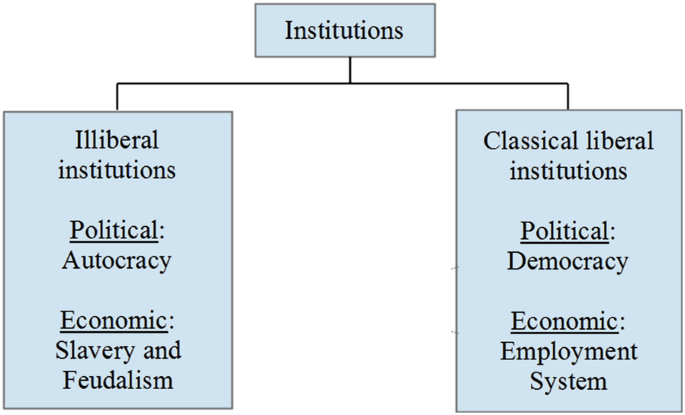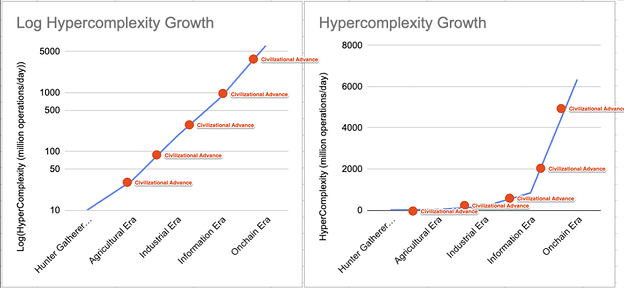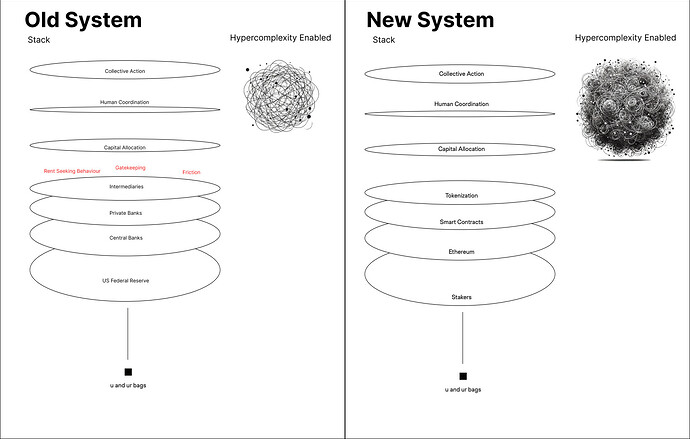(Thanks to Venkatesh Rao + @ccerv1 for reviewing drafts of this post.)
Onchain Capital Allocation Unlocks Civilizational Advancement
TLDR
- Civilization is Hypercomplex: Modern civilization is an intricate web of interlinked systems—social, economic, and technological—that create dynamic and unpredictable challenges.
- Scaling Hypercomplexity creates civilizational advances- Scaling hypercomplexity can drive civilization forward by fostering more adaptive, resilient, and innovative systems.
- Ethereum is a civilizational advance: By enabling more efficient and effective coordination with decentralized trust, transparent governance, and automated smart contracts, Ethereum helps societies coordinate across these many-layered complexities more effectively.
- Onchain Capital Allocation is a civilizational advance: Mechanisms like Quadratic Funding, Retro Funding, Futarchy, etc scale hypercomplexity, directing resources to the most impactful projects, adapting quickly to change, and ensuring a better coordination foundation for humanity.
Introduction
In his talk “There Are Many Alternatives: Unlocking Civilizational Hypercomplexity with Ethereum,” Venkatesh Rao explores how Ethereum offers tools to manage the growing complexity of modern civilization.
What is Hypercomplexity?
He describes the modern world as “hypercomplex,” with intricate networks of social, economic, and technological systems. Imagine our world as an increasingly tangled web of problems and opportunities—this is what Venkatesh Rao calls “hypercomplexity.”
Enabling Civilizational Advances
Scaling hypercomplexity helps civilization advance by enabling us to continually adapt our systems to new challenges, fostering greater resilience and innovation in how resources, information, and decisions are managed.
To quote Alfred Whitehead, “Civilization advances by extending the number of important operations we can perform without thinking of them.” . This is what’s called a Whitehead Civilizational Advance - When previously hard things become abstracted by better tech or protocols, then we as a civilization get to focus on higher-level concerns. A major category of civilizational advances is dealing with conflict among mutually incommensurate divergent narrative futures.
Examples of civilizational advance:
- Freedom of religion => replaces religious wars with pluralistic peace.
- Rule of Law => replaces violence with peaceful conflict resolution.
- Forgiveness (as taught in Christianity) => replaces eye for an eye + tit for tat warfare with de-escalatory behavior.
- Modern Markets => formalizes a system coopetition that allocates resources.
Each of these increased the number of narratives that could co-exist by automated relationships among them.
Ethereum Advances Civilization
Traditional ways of handling hypercomplexity often rely on big institutions, which can be slow, opaque, and prone to unfairness. These systems face challenges like inefficiency, centralization, and a lack of transparency.
Ethereum provides an alternative to traditional institutions by enabling decentralized coordination and trustless systems, which can handle this complexity more effectively. Using Ethereum’s smart contracts and decentralized governance, Rao envisions a future where communities can self-organize, align incentives, and distribute resources more transparently. This shifts control from traditional centralized authorities to individuals and communities, fostering innovation and inclusivity.
This new way of working means communities can pool resources, make collective decisions, and reward good work without the need for big, controlling organizations. Ethereum creates a playground for innovation where everyone can contribute and benefit more equitably.
Continuing the legacy of Liberalism
A key property of Ethereum is it is a plural technology - it doesn’t have one narrative or enshrined value set. It enables many divergent stories that don’t even share the same narrative. This is in contrast to more centralized, less pluralistic, technologies that lock users into one way of being to use it. This is an important attribute of Hypercomplexity is sustaining many mutually incommensurate, divergent, narrative futures, at the same time. (eg you cannot judge one story by another story’s terms).
Ethereum did not invent pluralism. In a sense, it’s pluralism is an extension of the philosophy of Classical Liberalism (not 2024 leftist-liberalism, Classical Liberalism), with its emphasis on individual liberty, limited government, and the protection of private rights, supports a social framework in which diverse beliefs, values, and lifestyles can coexist. By ensuring freedom of thought, expression, and association, it creates an environment where multiple viewpoints and groups can flourish, fostering pluralism.

Ethereum extends this philosophy by acting as a substrate for building a new era of cooperation and adaptability. Ethereum is like a new kind of glue that can hold pieces of this web together more flexibly and transparently. It allows anyone to write “rules” (smart contracts) that run on its blockchain, ensuring trust and fairness without needing a middleman.
Onchain Capital Allocation scales HyperComplexity
What is capital allocation?
Capital allocation is a simple concept: it’s the act of deciding how to distribute funding or resources. If you’ve ever paid bills, taxes, or repaid friends for a meal, you’ve allocated capital.
Allocating funds is a task for most individuals but a full time job for many: governments and grant-making organizations spend vast amounts of time and money figuring out the process, logistics, and decision-making involved in allocating capital.
At scale, capital allocation inevitably becomes mired in gatekeeping, rivalrous decision making, and a lack of transparency and accountability, thus hampering human progress and our ability to innovate and address collective challenges.
The opportunity for onchain capital allocation
Humans are not good at making lots of decisions - it is mentally taxing. To advance capital allocation, we need to abstract the low-value decisions away to enable more high high-levl thinking.
Ethereum provides a perfect substrate for doing so. With Ethereum we can program our values into our money. By leveraging the properties of blockchains - global, easy to access, transparency, incorruptability, programmability - onchain capital allocation mechanisms present incredible advantages for allocating capital in an efficient, democratic, and transparent way.
Onchain capital allocation scales hypercomplexity (and subsequent civilizational advances) by enabling resource distribution with unprecedented transparency and efficiency.
Mechanisms such as Quadratic Funding, Retro Funding, Futarchy, and other decentralized capital allocation mechanisms align incentives with community needs, ensuring that funds flow toward impactful projects. This approach reduces waste, democratizes decision-making, and empowers communities to solve pressing problems collectively.
On-chain capital allocation leverages the computational power of modern systems to scale hypercomplexity by processing and acting upon far richer datasets than traditional analogue methods. Quadratic Funding exemplifies this by enabling a “high-resolution” representation of community preferences.
Unlike traditional democracies, where funding decisions are made based on crude, binary votes or top-down processes, Quadratic Funding captures nuanced contributions and amplifies the collective intent of diverse stakeholders. This creates a funding landscape that adapts to the complexity of modern needs, ensuring resources are allocated not just democratically but with precision.

The computational capacity of blockchain systems allows for real-time data aggregation, transparency, and decision-making at a scale previously unimaginable. Thousands of interactions—micro-donations, tokenized votes, and governance decisions—are recorded, analyzed, and executed seamlessly.
These systems can process orders of magnitude more information than analogue democracies, enabling communities to respond dynamically to evolving needs. By transforming complexity into actionable insights, on-chain allocation mechanisms not only handle hypercomplexity but thrive within it, paving the way for more equitable and efficient resource distribution.
Allo has a role to play here.
With this opportunity laid before us, it is up to us to seize it. I believe that we must find a way to organize the world’s top mechanism designers, web developers, founders, hackers, and social change makers, to discover the best onchain capital allocation mechanisms.
If we are successful in creating, accelerating, or amplifying the next best mechanisms, we play a meaningful role in accelerating civilizational hypercomplexity. As Vitalik puts it in his Dec 2024 Greenpill Podcast appearance at 35:20 “high quality allocation is a problem that must be solved”.
Ethereum provides the computational substrate. We need to provide the capital allocation mechanisms that leverage this substrate and deliver on the promise of scaling hypercomplexity and creating civilizational advance.
How do we know where the best mechanisms are? I think there are two ways of knowing
- A priori - sound game theory
- Empirical - works in practice and the data shows it
And once we’ve established sufficient pattern matching to know which mechanisms are worth acceleration, the way we can do that is:
- Distribution - Give them distribution to our network of partners.
- Software - Help them build their software.
- Investment - Give them some seed capital.
Through this systematic exploration of the design space and acceleration of the top mechanisms, we can deliver on the promise of scaling hypercomplexity and creating civilizational advancements.
Conclusion
By recognizing that civilization is inherently hypercomplex and that scaling this complexity (with an eye towards plurality) can drive greater innovation and resilience, we open the door to more adaptive, precise, scalable, and effective systems of governance, coordination, and resource allocation.
Ethereum provides a powerful substrate for this transformation, enabling decentralized collaboration and trustless mechanisms that reduce reliance on traditional gatekeepers.
On-chain capital allocation further advance these ideals, leveraging the computational substrate of Ethereum to coordinate humanity’s resource in a more modern way. By using transparent, data-rich processes to direct resources toward the most impactful projects, onchain capital allocators push civilization forward.
We must seize this opportunity to advance civilization through better capital allocation.

